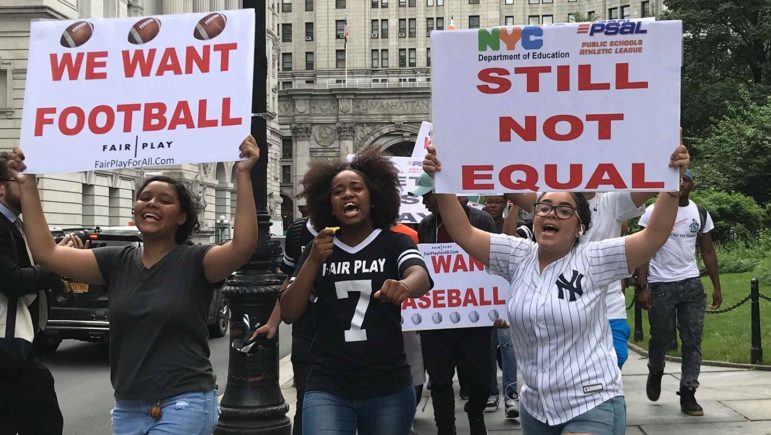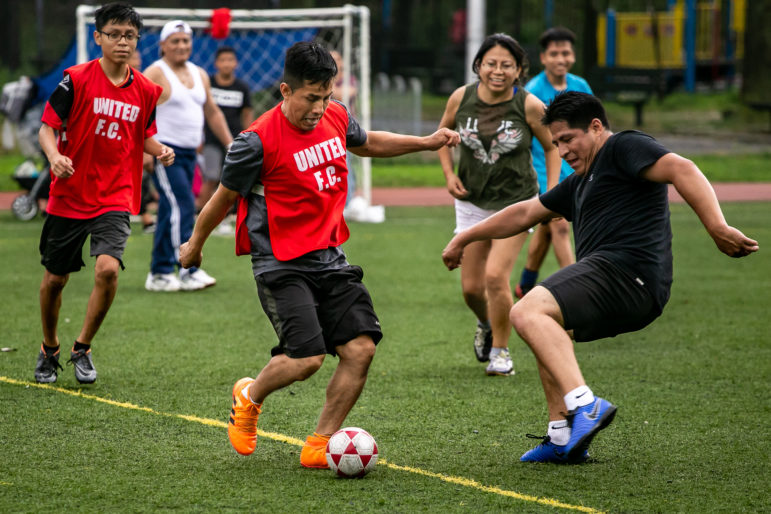The DOE and the Public Schools Athletic League (PSAL) are required to launch 200 new teams in the next two years, part of a settlement over disparate access to sports for Black and Latino students. The change comes at time of increasing competition for sports fields and courts: The city turned down a quarter of the permit requests it received last year, up slightly from before the pandemic.

Sneha Dey
NYC high school students at a rally for more equitable sports access in 2018.Lea la versión en español aquí.
The city’s Department of Education (DOE) and the Public Schools Athletic League (PSAL) are required to launch 200 new high school sports teams over the next two years—part of a settlement, approved by a state court this month, in a lawsuit over disparate access to sports for Black and Latino students.
New York Lawyers for the Public Interest (NYLPI) filed the class-action lawsuit on behalf of city students in 2018, alleging the city’s policies for funding and allocating high school sports teams violated the New York City Human Rights Law. It cited more than 100 public schools without any sports teams, saying Black and Latino students are more likely to lack access and that the city has historically spent less on a per capita basis on sports for these students compared to their peers of other races and ethnicities.
“Thousands of New York City public high school students will benefit from this,” said Jenny Veloz, lead organizer for the Fair Play Coalition at NYLPI, where youth activists have campaigned for increased access for the last several years after noticing the disparities, particularly for smaller schools predominantly attended by students of color when compared to larger high schools.
“As someone who has always loved sports, I was amazed that the New York City high school with the most white students had 44 teams, while my school had only four,” Matt Diaz, one of the plaintiffs in the lawsuit wrote in an op-ed for City Limits in 2018, when he was a student at the Urban Assembly Bronx Academy of Letters. He described another student whose school was forced to host basketball practice in its auditorium, or “gymatorium.”
“Most auditoriums have a slanted floor, so the ball would roll downhill every time they tried to shoot it and they would have to run uphill to score,” he described. “Do white kids have to play in a gymatorium?”
As part of the lawsuit’s settlement, the DOE and PSAL are required to expand the number of sports teams offered under its Shared Access Program, which allows high schools located near one another to play on combined sports teams. The DOE will survey all students at participating schools to help determine which new sports to offer, and must create at least 200 news teams by the spring semester of 2024, prioritizing schools that have fewer options.
“For us and for this work, it goes beyond the actual physical playing of sports,” said Veloz, who pointed to other socioeconomic benefits from the practice, including access to college scholarships, the development of leadership skills, and for some students, an increased motivation and interest in school.
“Just having that door opened for them is huge,” she says. “Sports can give youth an outlet where they may not have any other options.”
In a statement, DOE spokesperson Suzan Sumer told City Limits the agency has invested $6 million for the PSAL expansion. “We’re committed to providing equitable access to our incredible PSAL programs and putting the life-changing power of sports in our student’s hands,” Sumer said. “Students from every zip code will have access to PSAL athletic programs that support their health and wellbeing.”
Some 46,384 students participated in PSAL sports during the 2018-2019 school year. In March of 2020, COVID-19 shut down schools as well as their sports teams; the city only began permitting high school sports back in phases during the spring of 2021.
The pandemic created similar disruptions for use of the city’s athletic fields and courts, where student and adult teams alike compete for reserved space through the NYC Parks Department’s permitting process. COVID-19 forced the agency to suspend the issuance of permits in spring of 2020, though sports fields reopened for use that summer on a first-come, first serve basis.
READ MORE: New Sports, More Players and Limited Space are a Challenge to NYC Parks

City Limits / Adi Talwar
Members of the the United Soccer Club playing at the Williamsbridge Oval Park in The Bronx.
The Parks Department began issuing permits again for youth teams only in fall of 2020, though halted them once more later that season after COVID-19 cases surged back up. Last year, the first full year that both student and adult players could apply again to reserve a field or court space, the Parks Department received 15,635 athletic field permit applications, about 500 more than in 2019.
Those numbers include requests from PSAL and other school leagues, which are given priority for the permits. Demand for the spaces remains high: Parks denied more than a quarter of the permit requests it received last year, up slightly from 2019, when it turn down just over 23 percent of applications. In Brooklyn, nearly a third of permit requests were denied last year.
| Approved | Denied | Withdrawn | Total | Percent of Requests Denied | |
| Manhattan | 3329 | 1433 | 1488 | 6250 | 22.90% |
| Bronx | 665 | 383 | 292 | 1340 | 28.50% |
| Brooklyn | 2000 | 1285 | 717 | 4002 | 32.10% |
| Queens | 1760 | 708 | 983 | 3451 | 20.50% |
| Staten Island | 317 | 146 | 129 | 592 | 24.60% |
| Totals | 8071 | 3955 | 3609 | 15635 | 25.29% |
Still, the Parks Department says it’s ready for the additional high school sports teams the lawsuit settlement will bring. “We are dedicated to supporting equitable field access for the children of this city including through the PSAL and Department of Education, and we’re confident we have the staff and parkie-power to ensure a successful upcoming season for our permit-holders,” the agency told City Limits in a statement.
Mayor Eric Adams’ preliminary budget for the upcoming fiscal year, which starts July 1, proposes allocating $557.1 million for the Parks Department, a nearly $63 million reduction from the year before. Open space advocates are calling for the city to boost parks funding to at least 1 percent of the city’s $98.5 billion total budget.









2 thoughts on “Hundreds of New Sports Teams Coming to NYC Schools Following Racial Equity Lawsuit”
A crucial issue is finding properly certified coaches, starting w/ an up-to-date First Aid course plus other requirements… most small HS do not have staff w/ certified coaches, multi-school campuses have campus wide teams, some small schools want their own teams, some small schools only have a handful of students (track & field), hopefully PSAL does attempt to reduce coach requirements, would endanger student athletes..
You have some students with tremendous athletic ability that never get their opportunity to be seen because of the school they attend and if the high school hasent had these sports teams in place in the past it’s not organized the way schools who have had sports in place for years but at least now there trying to get it together